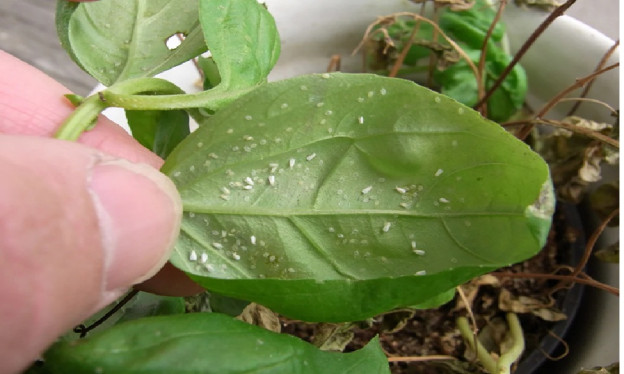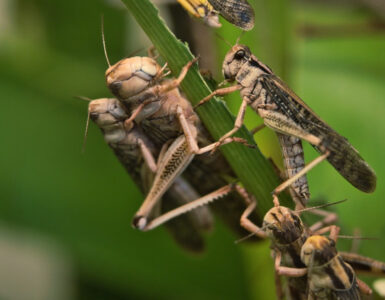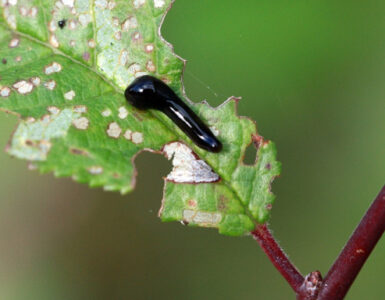To combat whiteflies, you can use natural methods.
Introduce their predators, use sticky traps, apply neem oil, and so forth. These remedies can help control whitefly infestations.
Whiteflies can cause damage to a wide range of crops, including tomatoes, sweet potatoes, and pepper plants. That’s why you must get them under control as soon as possible.
Here’s how to get rid of whiteflies naturally:
1. Neem Oil Spray
This organic treatment has a unique smell that deters many insect pests. It also works excellently as a natural remedy for whiteflies.
Neem oil will repel adult whiteflies. It will also smother whitefly eggs and larvae.
Combine four teaspoons of neem oil with one teaspoon of organic liquid soap and a gallon of water. Shake well and apply to the leaves and around the plants.
Neem is also an effective fungicide, and you can use it to treat sooty mold that thrives in the honeydew residue that whiteflies produce.
2. Vacuum Them
One of the simplest and cheapest home remedies for whiteflies is to vacuum them away.
Using a small hand-held vacuum cleaner, you can suck them up from under leaves and on plant stems. Then, empty the vacuum bag into a sealed plastic bag. Throw it away from the home and garden.
3. Soap and Water
Soap spray is also a cheap home remedy for whiteflies in your vegetable garden.
Mix four tablespoons of organic liquid soap with 1 gallon of water to make a DIY whitefly spray. You can also use a mild dishwashing liquid if you do not have organic soap.
Use the solution to mist your plants. The soapy water will kill whiteflies.
Spray in the evening and repeat the process every few days until the insect infestation is completely gone.
4. Sticky Traps
When used properly, these can be effective deterrents. Yellow sticky traps are the most attractive color for capturing whiteflies in the house and on garden plants.
Hang the traps near plants and in the greenhouse. After getting trapped, the pests will become immobilized and eventually die.
5. Natural Predators
This method is at the heart of organic pest control. Natural predators of whiteflies include ladybugs, dragonflies, garden spiders, and green lacewing larvae.
The parasitic wasp Encarsia formosa is also an excellent whitefly killer. The females lay their eggs inside host insects and hatch out to feed on and destroy the pests.
Besides, you can purchase most of these beneficial insects to help populate your garden.
6. Handpicking
A laborious but straightforward method to keep whiteflies off plants is to remove them by hand.
A soft cloth or a piece of a kitchen towel can be used on the leaves to collect and destroy these pests. Also, cut any infected parts off your crops.
7. Worm Castings
Earthworms are beneficial to plants by incorporating organic matter into the soil. Their poop (worm castings) raises chitinase in plants, repelling whiteflies [1].
Also, worm castings are a popular organic fertilizer. You can make your own or buy them at gardening stores.
8. Repellent Plants
Plants that repel whiteflies include chives, thyme, peppermint, and basil. The critters hate the scent of these herbs.
Marigolds also deter tomato whiteflies [2]. Utilize these as companion plants to help get rid of whiteflies in the garden.
9. Birds
Whiteflies are also included in the diet of many birds. Chickadees and other songbirds can help clear your yard and garden of whitefly infestations.
To make your garden more attractive to birds, provide them with shelter and additional food.
10. Garlic Spray
Garlic is an effective home remedy for combating cabbage whiteflies and other pests.
Crush about four garlic cloves into a tablespoon of mineral oil, then let it stand for a while. Next, strain the solution and add approximately a pint of water.
To use this natural whitefly treatment, spray it by hand on outdoor plants or those in a greenhouse.
11. Reflective Mulch
Gardeners often use this type of mulch to reflect light on plants in shady areas. The reflective material confuses these white insects, causing them to move elsewhere.
12. Epsom Salt
Epsom salt can help combat whiteflies and other pests on plants. Make a spray by dissolving two tablespoons of Epsom salt in a gallon of water.
Apply the solution to your plants. It will help control whiteflies, mealybugs, aphids, and other pests.
13. Baking Soda
Baking soda spray is also an excellent homemade pesticide for your vegetable garden. Combine two tablespoons of baking soda and one teaspoon of dish soap in a gallon of water.
Mix thoroughly until the baking soda completely dissolves. Finally, use this homemade whitefly spray on your plants.
14. Vinegar
Vinegar will also kill whiteflies. Use it to make a watered-down solution that is safe for your plants.
Combine one part white vinegar with four parts water, and apply it to the affected plants.
15. Molt-X
Molt-X is an organic pesticide for ash whiteflies, aphids, fungus gnats, and other soft-bodied pests. It is a commercial concentrate of azadirachtin, one of the most effective components derived from neem seeds.
The product disrupts molting and affects all other life stages of insects. Feeding also stops. As a result, these pests will fail to develop and slowly die off.
Dilute it with water according to the instructions, and spray it on and around the plants.
16. JMS Stylet Oil
JMS Stylet-Oil is an OMRI-listed whitefly control product. It is safe for fruit trees, vegetable crops, and ornamentals. You can also use it to prevent and kill powdery mildew.
This natural insecticide kills whiteflies. It also effectively disrupts the life cycles of many other insect pests.
Takeaway
You may know them as white flies, white-flying insects, white flying bugs, or white gnats. Whatever you call them, these pests weaken plants by feeding on them.
Whiteflies are commonly found on houseplants, such as African violets and guava trees. They also infest petunias, roses, hibiscus, citrus, and other plants, both indoors and outdoors.
You will also find whiteflies on Brussels sprouts, broccoli, basil, beans, and kale.
The most effective way to eliminate these pests is to employ a combination of natural pest control methods, as described above.








Great ideas! Especially: to use a combination of methods. And using them in conjunction with natural predators. Thank you!
What kind of vinegar do you use?????
Regular, white vinegar.
I want to get rid of white fly on my swan plants, but not kill Monarch caterpillars. What can I use, please?